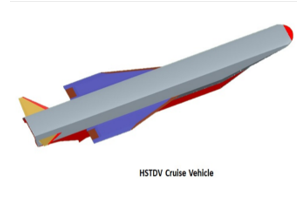Recently, Defence Research and Development Organization (DRDO) successfully test-fired India’s first long-range hypersonic missile indigenously developed by the DRDO, laboratories of Dr APJ Abdul Kalam Missile complex, Hyderabad along with various other DRDO labs and Industry Partners.
- It was launched from Dr APJ Abdul Kalam Island by Hypersonic Technology Demonstrator Vehicle (HSTDV).
- The missile is designed to carry various armed forces’ payloads and can be used by all branches of the Indian armed forces.
- DRDO confirmed that the missile was tracked by multiple systems and that the flight data showed successful terminal maneuvers, with a high degree of accuracy in hitting its target.
- The flight test validated key technologies, including hypersonic aerodynamic design, scramjet propulsion for ignition and sustained combustion, high-temperature material performance and separation mechanisms at hypersonic speeds.
- It is designed to carry different armed forces’ payloads over distances greater than 1,500 Km.
- About Hypersonic:
- Hypersonic Speed: Refers to speeds at least five times the speed of sound (called Mach-5), about a mile per second.
- Maneuverability: Hypersonic missiles can change course during flight, unlike ballistic missiles.
- These missiles can carry both conventional and nuclear warheads
- Types of Hypersonic Weapons:
- Hypersonic Glide Vehicles (HGV): Launched by a rocket, then glide to the target.
- Hypersonic Cruise Missiles (HCM): Powered by air-breathing engines (scramjets) after target acquisition.
Hypersonic Technology Demonstrator Vehicle (HSTDV)

- HSTDV is an unmanned aircraft designed to demonstrate hypersonic flight with a speed of Mach 6 (six times the speed of sound) and an altitude of 32.5 km in 20 seconds.
- It is based on hypersonic propulsion technologies.
- Key points:
- It can intercept missiles in both the outer and inner atmosphere.
- It has civilian uses as an energy-efficient, low-cost and reusable satellite launch vehicle and long-range cruise missile.
- The only other countries that possess this technology are the US, Russia and China.

